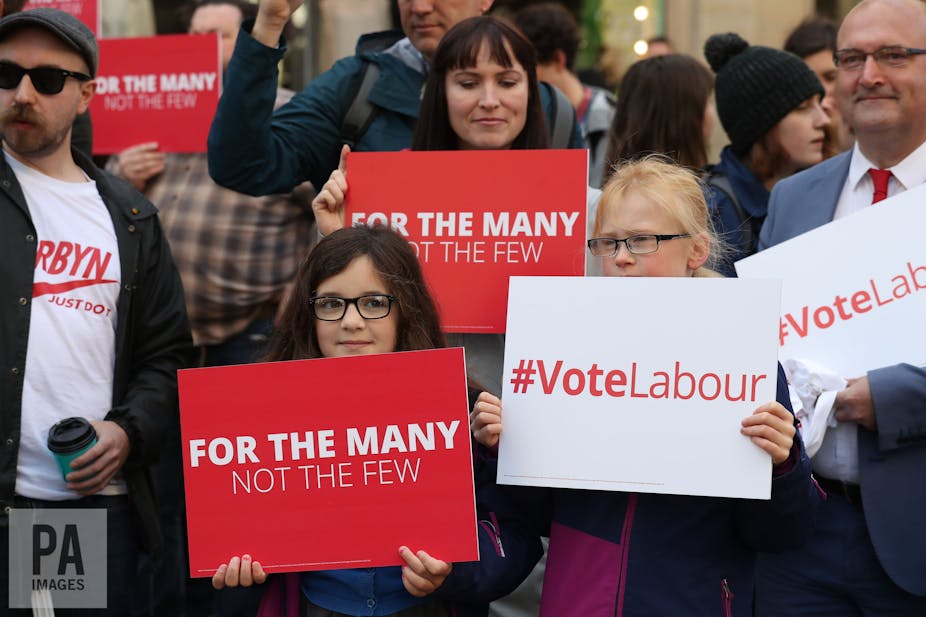The conventional wisdom on polling day was that Britain’s young voters would probably back Labour. Some polls found that as many as 63% of under-24s supported Jeremy Corbyn’s party. But before the polls closed, it was also received wisdom that young people would turn out at dramatically lower rates than their older counterparts. Everyone knows the story of young abstention: since the 1990s, young people have been harangued and pestered with celebrity endorsements, catchy slogans and broken promises in attempts to get them voting. But time and again, the majority vote of the young has been no vote at all.
The political establishment generally offers two inadequate explanations. One is poor engagement: the idea that while there’s nothing essentially wrong with the politics on offer, young people just don’t bother to sign up for it. The other is apathy: that young people are now so worn down by years of austerity and hopelessness that they’re stuck in their own little bubbles trying to somehow find a home and a job and make it to middle age, all the while too busy and exhausted to get educated, interested or organised.
These ideas are wrong. Young people aren’t different to the rest of the population. They need the same things in life. An income to rely on, a place to live and raise a family, and hope for themselves and the world around them. For too long they’ve been overlooked, treated like an outlier group of defective voters who would never participate in politics because they simply can’t be bothered.
Their role in the 2017 result is a serious reality check – and beyond that, it speaks volumes about how rapidly Britain is changing.
A new politics blossoms
This election was a contest between two visions of what that change should entail. For the Conservatives, the political establishment, the pollsters and the guardians of conventional wisdom, British politics has become Brexit politics. The Conservatives aligned themselves with the Leave vote to gobble up UKIP votes and to capitalise on a supposed Leave-Remain split in Labour’s core vote. The Tory campaign was a monolithic construction of repetitive slogans and negative, personal attacks on leading Labour figures.
The Labour campaign approached things differently, and came to the country with an entirely different vision. Theirs was a campaign of economic visions: austerity versus anti-austerity – those who profit from cuts versus those hurt by them. This naturally resonates with young Britons, the first generation since World War II expected to be worse off than their parents.

Young people were Labour’s base; the question was whether they would show up. In the end they did. When the now-famous exit poll came in, the political establishment people immediately began rifling through the pre-election polls for signs of discrepancies. Was a hung parliament even possible? Why was YouGov’s prediction more accurate than ComRes’s?
If you study young people’s politics, you probably did what I did: put the polls aside and looked at turnout. A high turnout – especially in young constituencies and seats that encompass universities – spelled trouble for the Conservatives, especially after months of record-breaking voter registration and a Brexit referendum that had young voters fired up.
A better life
The signs were there long before polling day. Just think about the set-piece moments of Corbyn’s campaign. Turning up at a gig at Tranmere Rovers football stadium. The rallies in cities where people were climbing trees and buildings to watch. The music, including the huge swell of pride and hope in the grime scene and chants to the tune of the White Stripes’ Seven Nation Army – these aren’t just the cultural markers of a young social movement. They are the first green shoots of a return of proud, organised working-class politics.
Young people are at the heart of it all. If you’re young and living in Britain today, you’re less likely to hold a steady job than a series of insecure gigs, leaving you with a jumbled CV of zero-hours contracts and unreliable work. No savings, high rent, and huge tuition fees if you’re fortunate enough to make it into higher education. No-one should be surprised that young people offered this dismal social contract instead opted for the promise of investment in the welfare state, secure contracts, and an end to tuition fees.
This movement (and a movement it truly is) will live or die by the success of its central project: to prove that a country as prosperous as Britain can and should invest in itself to bring up and support those who have been left out by austerity. This will mean organising the young people who’ve been inspired to vote and making sure they see their votes make a tangible difference.
Everyone who’s part of this surge needs to make plans to keep the movement going and give young people some control over their own lives. Perhaps this work will be done through Corbyn’s Labour Party, the unions, or something completely new and unexpected – but wherever it happens, the next few historic months will be critical.

